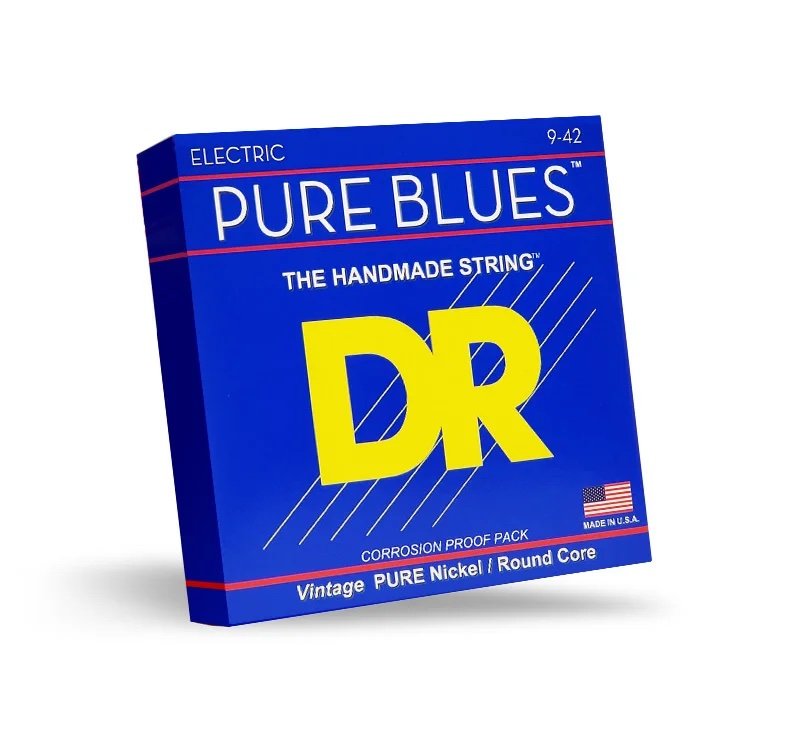DR Hand Wound Guitar Strings
Over the years, I've used every brand of guitar strings accessible for purchase. I was like many trying to find guitar strings that were right for me. So I strolled down a slot of avenues. I tried boutique strings and cheaper bulk strings.
Finding the right match of strings can be tricky. First, some strings are OEM-made, meaning they're not manufactured by the name you see on the package. This also means that you may notice little difference between a few more prominent brands because, technically, they are the same strings with different names.
I'm not here to throw shade. Because some strings are OEM manufactured, it doesn't make them bad. It just means part of why you don't feel or hear a difference between the two brands isn't that guitar strings aren't different by nature. It could be because they are, in fact, the same strings.
There is a difference between guitar strings when manufactured by different companies if they're not OEM.
I want to discuss the points I usually use to evaluate guitar strings. But how you assess will change depending on your needs/tastes.
New
How strings age is important to me. I'm not the biggest fan of the brand-new string sound. My sweet spot for strings is usually when they've been on for about a week. They're still somewhat new (unless you've been gigging every night), but the tone has mellowed slightly.
Some strings have a sharp curve to aging. They go from being brand new to dead with very little in between. This style of strings, say from D'Addario, doesn't suit me. I need more of a long-term relationship when I put a pack of strings on. I like strings that have a long mid-life.
Tuning
I have used some strings that don't hold tuning as well. Tuning issues are a deal breaker for me. I work in many high-pressure situations, such as sessions and performances—environments where there isn't a lot of forgiveness for gear failure.
Often on sessions, I'm expected to nail a take in one or two passes. So, if my guitar strings go out of tune, it will be a problem. I have put guitar strings on, stretched them, and still had tuning fluctuations where I had to rip the strings off.
Feel
We talked about tuning and tone, but we must also remember feel. Some strings feel tighter, and others looser. I prefer strings that feel looser. You may not, but it's worth noting as a point of interest.
The Reveal
My favorite guitar and bass strings are DR brand strings. DR strings are handmade and aren’t an OEM rebranding company. DR is based in New Jersey across the Hudson from NYC, my place of habitation.
DR is not a new company. They have been making strings for a long time. I first tried them in the '90s. As a young guitarist, I was trying all kinds of strings. I would always come back to DR. Why, though?
The tone of DR strings always left an impression on me. For electric, I always loved the DR Blues, which are pure nickel. They had all the warmth I wanted in a guitar string without sounding dull.
The feel was also very balanced, and I didn't feel like I was fighting the strings. They also have an excellent mid-life and even long-term life.
I have found the DR has very high-quality control. However, I have used strings from some companies (even big names) where you put a pack of strings on, and they're a real stinker. The intonation can be wonky is one example of a faulty set.
I can't remember this ever happening with DR. Now, nobody is perfect, so if it happens to a set of DR strings, don't send me hate mail. Instead, realize that flukes do happen. It would be extremely rare, though. DR strings are entirely trustworthy and consistent.
All string materials and packaging from DR are 100% made in the USA, which is incredibly rare at these times.
Variety
Over the years, DR has added new string designs to their family of strings. One of the more recent additions is the Vertis line. Here's what the DR website has to say about them:
VERITAS™ Electric Guitar Strings maintain their tone, tuning stability, and intonation thanks to Coated Core Technology™, a process of coating the round core wire, which locks the wrap wire in place and extends string life by protecting the core from corrosion. A Quantum Nickel™ wrap wire delivers more power, brighter tone and greater flexibility and responsiveness.
I've been jumping between several DR strings depending on what I'm doing. I've been using the Vertis for more of my hard rock/metal-style projects (Steel Tooth Cactus).
When I'm doing more blues and old-school rock (fife & Drom, Future Relics), I use the DR Pure Blues. I'm switching between the Dragon Skin, Vertis, and Rare on acoustic guitars. The Rare are low tension, which I'm a fan of since I use medium gauge strings.
The Dragon Skin series is a coated string that lengthens the life of strings.
DRAGON SKIN™ Electric Guitar Strings feature DR's K3™ clear coating on a nickel-plated steel wrap wire to prevent dirt and perspiration from reaching the round core wire, preventing corrosion. The K3™ coating, which is applied to all strings in the set, is ultra-hard and doesn't dampen vibration like softer coatings can. The strings have more projection, fewer unwanted overtones, greater clarity and articulation than uncoated strings.
A little info on the Rare model of DR Strings as well:
Low tension...the sound is loud and warm.The Rare phosphor bronze acoustic strings are a departure from the standard, good quality bronze string currently available...not necessarily better, but possessing a new, different and stronger "voice". When DR set out to produce a string with new characteristics, our goal was to redesign contemporary thinking about what phosphor bronze can do for a good acoustic guitar. Hand-carved arch-tops, dreadnaughts and good steel string acoustic guitars made of rosewood, maple, and mahogany seem to benefit from a distinct improvement in tone, depth, and sustain with Rare phosphor strings. Players who want a fatter and louder sound, as well as a deeper bottom (who like to hear their guitars ring out) will appreciate the Rare phosphor tone, sound, and feel.
Mono
You may find that you only use one type of DR strings. I use a variety because the type of work I do changes quite frequently. This makes a great point about DR strings in that they are a small company that makes excellent strings and offers terrific variety.
Anyone reading my blogs knows I don't just write fluff articles. I live with gear for a while before I write about it. Although it's still opinion based, my motivation is simply from a tone and reliability perspective as a pro musician.
I suggest you get a variety of guitar strings from other companies (make sure the gauges are the same), then try them all and take notes and record examples.
Pay attention to feel, intonation, tuning (make sure you stretch your guitar strings, lube your nut and string tree), life span, tone, and durability. I wouldn't be surprised if you came back to DR by the end of your experiments as I did.
One thing to mention, just because strings are handmade doesn't mean they will be better. I have used some strings from boutique manufactures that suffered from tuning instability, intonation issues, and durability. Of course, a handmade product matched with expert winders and high-standard quality control can make a superior string. But you do have to have all those elements, and I believe DR has.










